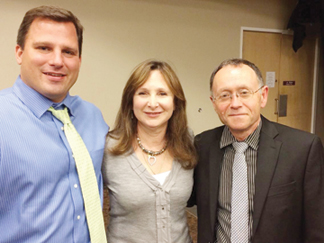
In 1990, when Roman Polonsky left the former Soviet Union with $150 and a piano and made aliyah to Israel, he said, “We had nothing to lose. We didn’t own much.” Many Russian Jews were underemployed or had no prospects for future advancement in their fields. While it’s easy to compare the situation today in Ukraine to the mass emigration of Jews from the FSU, Polonsky insists it’s totally different.
“Jews have made lives in Ukraine,” Polosnky explained in an interview prior to his public appearance at the Jewish Community Campus Monday night to more than 50 people. “They own their own homes, businesses, cars. While we had no choice in 1990, Jews in Ukraine do.” Should they wait until there’s civil war? Do they leave everything behind to learn a new language, get a new job, and build a new life in a country many have never visited? “It’s not so easy,” he added, “which is why we’re there to help.”
The “we” is the Jewish Agency for Israel (JAFI), where Polonsky heads the Agency’s Unit for Russian Speaking Jewry, And while lately he’s been spending more time in Ukraine (he was there prior to his visit to the United States last week, and will return next week after a one-night stay in Israel), Polonsky also covers the 250,000 Russian-speaking Jews in Germany, as well as those in Australia and other far-flung lands.
“Yes, the Jews in Odessa are concerned, even afraid,” he continued. “It was like a ghost town when I visited recently. People didn’t come out of their homes and rumors were rampant.” Of course, anti-Semitism in Ukraine has a long history, and World War II is not such a distant memory among the elderly Jewish population there. So that group, especially, has fears of being caught between Ukraine and Russia — yet, many are too frail to contemplate aliyah to Israel.
Young people — Jews and non-Jews — yearn for an open, free society and democratic institutions. No strangers to the Internet, they know what’s available in Europe and the West — and they want that for Ukraine. One of JAFI’s programs brings recent graduates to Israel for continuing education. “There are 150 slots annually in our normal budget,” Polonsky explained. “But we now have a waiting list of 100 more due to the situation in Ukraine.”
Polonsky’s job then is not only to inform Jewish communities like Greater Kansas City of the current situation in Ukraine, but also to educate leadership to the daily needs of those Jews who choose to stay. With 210,000 Jews spread from Kiev and the West to Kharkov and Donetsk in the East and Odessa in the middle, the Jewish Agency’s five permanent shlichim (literally messengers) have been boosted to include more staff that flies in from other regions and Israel for special projects.
Polonsky’s unit also covers summer camps run for children throughout the FSU, Birthright and MASA trips for young Jewish adults, servicing the elderly with meals and medication, as well as assisting anyone who wants to make aliyah. While the percentage of those wanting to make aliyah has tripled overall, only about 2,000 are projected to make aliyah this year — and even that small increase has budgetary implications. “We do have contingency plans, “Polonsky said, “but we hope we don’t have to use them. We want to see Jewish life in Ukraine flourish, and it’s because of communities like Kansas City that we can make sure it continues.”
In the meantime, $400,000 of JAFI funds have already been spent on security cameras and guards at Jewish institutions across Ukraine. One of those cameras caught the perpetrator of a Molotov bomb attack on a synagogue in Nikolayev. And fearing riots in Odessa, the rabbi of the large Orthodox synagogue took 1,000 of his congregants out of town on “Victory Day” May 9, the anniversary of the surrender of Germany to the USSR in World War II. That night, 40 Ukrainians were trapped in a burning building and died.
While a number of questions were raised Monday night about the political situation and upcoming elections on May 25, Polonsky reminded those in the audience that JAFI has to be able to work in both Russia and Ukraine. “It’s very gloomy right now,” he noted, “but one young man told me he wanted to make aliyah because in Israel he’ll find stability, security and peace.” That statement elicited laughter but Polonsky added, “We want Ukrainian Jews to come to Israel because they choose to do so, not because they have to flee.”
Karen Pack, a former president of the Jewish Federation, which coordinated Monday night’s event, and a member of the JAFI board of directors, is worried about the situation in Ukraine and the funds available to help the Jews there and in Israel.
“Our overseas allocations have been shrinking,” she said.
“In order to maintain Jewish life in the FSU, JAFI and the Joint Distribution Committee have to ensure a strong Jewish environment for those who remain. In a normal budget, we can provide for the necessities of Jewish community. But what happens when there’s a crisis?”
The Federation’s Israel & Overseas Budget Committee allocated $935,000 last year (through Jewish Federations of North America) to JAFI, JDC and other organizations, with another $70,000 to JAFI elective allocations. To meet additional needs, the Federation has established a special mailbox to accept donations for the Jews of Ukraine. For more information or to donate, visit www.jewishkansascity.org.



